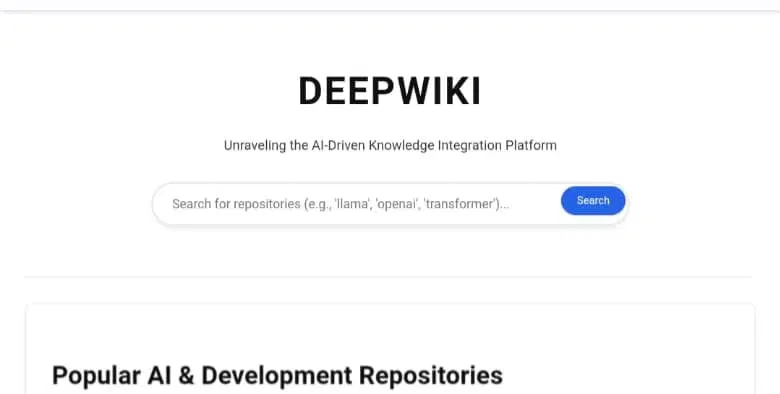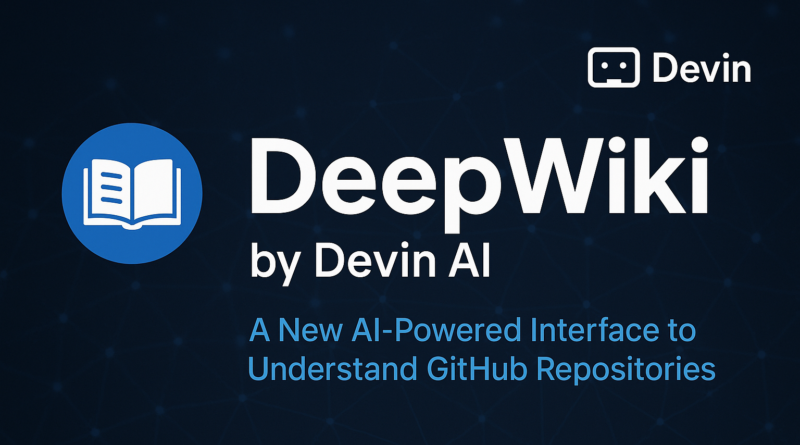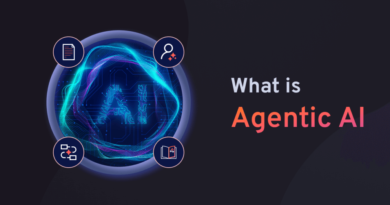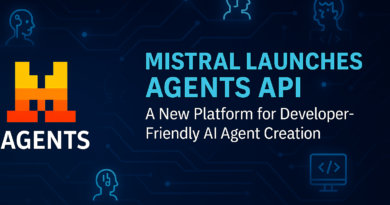DeepWiki by Devin AI: Redefining GitHub Repository Understanding with AI-Powered Documentation
Navigating unfamiliar GitHub repositories can be a daunting task for developers, particularly when projects are poorly documented or have sprawling, complex architectures. Recognizing this challenge, Devin AI has introduced DeepWiki, a free, AI-powered tool designed to simplify codebase exploration by automatically generating structured, wiki-style documentation from any GitHub repository.
Built upon Devin’s in-house DeepResearch agent, DeepWiki serves as a dynamic, interactive encyclopedia for open-source (and soon private) projects, aiming to make code comprehension easier, faster, and more intuitive.
What is DeepWiki?
DeepWiki functions as an AI-powered interface layered over GitHub repositories. When a user inputs a repository URL, DeepWiki analyzes the project’s structure, source code, configuration files, and available documentation (such as README files). The tool then produces a highly organized and accessible output that includes:
- A concise project summary outlining the repository’s purpose and main functionalities.
- Technology stack identification, highlighting key frameworks, languages, and dependencies.
- An interactive file explorer that provides module-level and file-level explanations.
- Automated architectural diagrams and dependency graphs for visual understanding.
- Natural language Q&A to query the repository about specific modules, functions, or workflows.
Critically, DeepWiki requires no installation. Users can start instantly by replacing github.com with deepwiki.com in any public repository URL. For example:
Instead of https://github.com/username/repo , use https://deepwiki.com/username/repo to access the generated documentation.

Key Features and Innovations
1. Conversational Repository Understanding
At the heart of DeepWiki lies an AI assistant (powered by DeepResearch) that enables developers to ask questions naturally — such as “Where is the user authentication implemented?” or “What does the payment module depend on?” — and receive precise, context-aware answers.
This bridges the gap between static codebases and dynamic, conversational code exploration, enhancing onboarding and reducing learning curves for complex repositories.
2. Deep Research Mode
For power users, DeepWiki provides an optional Deep Research Mode, offering:
- Deeper semantic analysis of code.
- Detection of potential code smells and optimization suggestions.
- Architectural critiques at the system design level.
This mirrors the insights one might expect from an experienced senior engineer or technical auditor.
3. Visual Architecture Mapping
Understanding how different components of a system interact can be challenging, especially in large projects. DeepWiki addresses this through automatically generated flowcharts and dependency graphs, illustrating:
- Module interactions.
- Data flow across the application.
- Service dependencies.
These visualizations offer a macro-level view of the repository without requiring manual digging through codebases.
4. Public and Private Repository Support
While DeepWiki currently supports public repositories for free access without login, enterprise users will be able to connect private repositories securely through authentication. This positions DeepWiki as a useful tool not only for open-source contributors but also for internal enterprise codebase management.
5. Lightweight, No-Friction Usage
By eliminating the need for installation, plugins, or onboarding procedures, DeepWiki emphasizes accessibility. Developers can instantly unlock insights by simply modifying the GitHub URL structure, ensuring near-zero adoption barriers.
How DeepWiki Works Behind the Scenes
Technically, DeepWiki combines several advanced AI and knowledge extraction techniques:
- Fine-tuned language models specializing in code understanding and software architecture.
- Relationship mapping algorithms that identify connections between files, classes, and functions.
- Knowledge summarization engines that distill large amounts of code and metadata into clear explanations.
- Vector search indexing for rapid retrieval of relevant code snippets based on user queries.
This hybrid approach ensures that the tool is not just scraping metadata but building a semantic representation of the repository.
Practical Implications for Developers
DeepWiki has the potential to impact several developer workflows:
- Open-source contributors can ramp up quickly on new projects.
- Technical auditors can review system architecture more systematically.
- Software engineers can reduce onboarding times when joining new teams.
- Project maintainers can ensure better documentation with minimal manual effort.
- Researchers studying codebases can navigate with enhanced clarity.
Rather than replacing manual code inspection or traditional documentation, DeepWiki acts as an augmentation layer that makes initial exploration and ongoing understanding faster and more structured.
Early Feedback and Community Response
Initial reactions from the developer community have been highly positive. Users appreciate how DeepWiki complements tools like GitHub Copilot, Sourcegraph, and manual documentation efforts.
Many users report that DeepWiki shines particularly when dealing with:
- Legacy codebases with minimal existing documentation.
- Complex monolithic repositories where modular decomposition is critical.
- Polyglot repositories combining multiple languages and frameworks.
However, it’s worth noting that DeepWiki’s outputs are dependent on the quality of the source repository itself — if the repository is disorganized or undocumented internally, even AI-powered documentation will have its limitations.
Conclusion: A New Era of Intelligent Code Understanding
Devin AI’s DeepWiki represents a significant leap forward in making codebases more accessible, especially in an era where open-source and collaborative development are accelerating.
By combining AI-driven conversational interfaces, structured documentation, and visual system mapping, DeepWiki doesn’t promise to replace developers’ judgment but empowers them with better starting points, faster comprehension, and actionable insights.
As AI in software development continues to evolve, platforms like DeepWiki exemplify the practical, high-value integrations that can supercharge developer productivity without demanding disruptive changes to workflows.
In a world where understanding code is half the battle, DeepWiki makes that journey smarter, faster, and more intuitive.
Check out the Tool here. Also, don’t forget to check out AI Toolhouse AI Agents Directory for the latest AI Agents.






